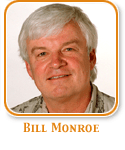forum
library
tutorial
contact

Global Warming
Giving Northwest's Weather that California Feel
by Bill Monroe
The Oregonian, May 16, 2004
|
the film forum library tutorial contact |

|
Global Warming
by Bill Monroe
|
Alaska is one of the fastest warming places on Earth.
The average has risen four degrees Fahrenheit in the past few decades.
 You're gonna love San Francisco.
You're gonna love San Francisco.
But Oakland is a drag and Sacramento is just plain hot, even if you can see the mountains once in a while through the haze.
Lots of bugs, too.
Global warming is no longer a figment of anyone's imagination, and if you want some sort of outdoor legacy for your grandchildren -- maybe even your own kids -- scientists suggest you start planning for:
"Sea ice is melting, and erosion is already causing some communities to move inland. The texture of salmon is changing from disease and diet. It tastes different."
Anchorage just had one of the most tepid winters in its recorded history. Other than one ice storm this year, Portland also has been uncomfortably comfortable for the past few years.
"It's no longer a problem that we may or may not see," said Glick, 40, who is moving to the federation's Seattle office this week to get closer to the action. "Human activities are causing it."
The earliest and most stark evidence was devastated coral reefs in the world's tropical seas. They're bleaching and dying as the water warms. Entire ecosystems are now skeletons.
New reefs might not spring to life in the deep north Pacific, but Glick said scientists at the University of Washington are looking closely at computer models showing warming rivers such as the Columbia, Snake and Skagit.
"There's a strong likelihood they'll look like rivers in California if we don't do something to slow global warming," Glick said.
You're gonna love San Francisco.
There are relatively few hot days there, and even those cool quickly in sudden fogs.
Fir and evergreens cling to the Pacific shoreline and make great golf country, fading at the crest of coastal foothills into vast grassy slopes studded with stands of oak.
Trouble is, that's on the coast . . . Astoria, I'm thinking.
It's already a deep-water port with room to grow (and dredge). A big bridge is in place over a river hosting the remnants of fairly good salmon runs, such as those still swimming into the Sacramento River. Some are endangered, clinging to life in hatcheries, so no change there, either.
I figure Oakland's climate will end up in Longview, Wash.
Think bass, panfish, striped bass and even more shad; sturgeon here and there and a few large rays to keep fishermen interested.
Sorry, but that leaves Portland with a Sacramento-type climate: hot and sticky in the summer when it's not bone dry. Good professional basketball team, though. Great coach.
Remnant trout streams still spill out of the Sierra Nevada range, and it's a fairly short drive to skiing, with lots of casinos just over the last ridge. Hmm, no change there, either.
We'll have to build new dams, of course. More stored water will quench the thirst of all those folks who move up here from Frisco.
They won't want to stay in a climate more like Los Angeles, which in turn could be the next Baja California.
Mexico, of course, might become uninhabitable.
If you still want to live in an Oregon-friendly climate, perhaps a move to British Columbia is in order. Enough U.S. immigrants could finally bring about a merging of the two nations, and we wouldn't have to pay quite as much for nonresident fishing and hunting licenses.
Or, Glick said, you can get concerned and get involved.
Americans are far and away the world's leading polluters through carbon emissions -- and the most technologically advanced to not only do something about it but lead the developing world to nonpolluting energy sources.
"It's up to people to care about the legacy they're going to leave their children," she said.
The Wildlife Federation has to be careful about its nonprofit tax status, but, Glick tactfully said: "The current administration has not shown the kind of leadership we would like to see."
Still, she added, Sens. John McCain, R-Ariz., and Joseph Lieberman, D-Conn., are key figures in a congressional push to clean up the United States' act.
The governors of Oregon, Washington and California have launched their own initiative to reduce greenhouse gas.
"There's a lag time for emissions to remain in the environment, so it will certainly get a little worse before it gets better," Glick said. "But we'll see far fewer effects if we can reduce emissions within the next 20 to 50 years.
"We may lose some species, but we can still give wildlife a fighting chance."
And leave Frisco right where it is.
learn more on topics covered in the film
see the video
read the script
learn the songs
discussion forum
